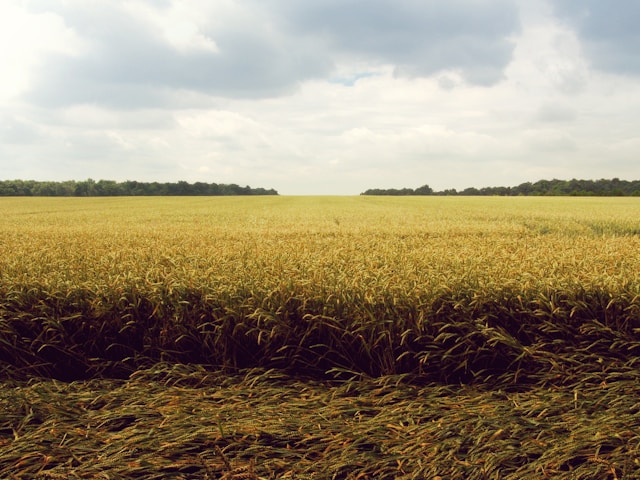As South Korea faces the ripple effects of a global food crisis and mounting agricultural instability, Acting President Han Duck-soo’s veto of the Grain Management Act has thrust the nation into a pivotal debate. While the political spotlight is on Han’s rare intervention, the core issue is much larger: the future of South Korea’s food sovereignty. At a time when climate change, global supply disruptions, and rural decline threaten agricultural sustainability, the Grain Management Act offers more than a solution for struggling farmers—it provides a framework for national security in an era of uncertainty.
South Korea’s agricultural sector has been caught in a perfect storm. Rice, once the backbone of the nation’s food system, now faces plummeting demand, with per capita consumption halving over the past 30 years. Overproduction has driven prices to record lows, leaving farmers grappling with mounting debts and diminishing prospects.
The Grain Management Act, passed by the opposition-controlled National Assembly, was designed to address these challenges. The legislation proposed mandatory government purchases of surplus rice, price compensation for farmers when market rates dipped below a baseline, and the inclusion of wheat and soybeans in public grain reserves. It also sought to encourage crop diversification and stabilize rural economies.
On December 19, Acting President Han Duck-soo vetoed the Grain Management Act, a bill designed to stabilize grain prices by mandating government purchases of surplus rice. The act, which was passed by the opposition-controlled National Assembly, faced criticism for its potential financial burden, with the Ministry of Agriculture, Food and Rural Affairs warning of excessive costs. Han’s decision reflects concerns that the proposed measures could lead to long-term surplus supply issues and strain government resources.
Han’s veto comes at a time when food security has never been more precarious. The war in Ukraine disrupted global grain exports, driving prices sky-high and creating shortages in vulnerable regions. Climate change has added further instability, with droughts and floods devastating crops worldwide. Against this backdrop, South Korea’s reliance on imported grains—accounting for over 80% of wheat and soybeans consumed—poses a strategic risk.
In such a volatile global context, food sovereignty is not a luxury but a necessity. Experts warn that failing to invest in domestic production could leave South Korea exposed to price shocks and supply chain breakdowns, particularly as geopolitical tensions escalate.
“Food security is national security,” noted a policy expert on agriculture. “A self-sufficient grain system isn’t just about feeding people—it’s about ensuring resilience in times of crisis.”
South Korea’s agricultural challenges are not unique, and the experiences of other nations offer valuable lessons.
In the United States, the Farm Bill serves as a cornerstone of agricultural policy, funneling billions of dollars annually into price stabilization, disaster relief, and direct subsidies for farmers. Similarly, Japan has implemented a comprehensive system of rice subsidies and crop diversification programs, ensuring its farmers remain economically viable despite declining rice consumption.
The European Union dedicates nearly a third of its budget to the Common Agricultural Policy (CAP), a wide-ranging program that supports farmers, ensures stable food supplies, and promotes sustainable practices. Even China, the world’s largest grain producer, maintains a robust grain stockpiling system and direct subsidies to achieve its ambitious 95% self-sufficiency target in key staples.
Compared to these programs, South Korea’s proposed investment under the Grain Management Act appears modest. Proponents argue that the law’s fiscal cost is not a burden but an investment in the nation’s agricultural resilience.
While critics point to the financial implications of the Grain Management Act, the cost of doing nothing could be far higher.
Economically, continued price declines threaten to devastate rural economies. Many farmers already operate at a loss, and without government intervention, mass bankruptcies and rural depopulation could follow. Socially, the erosion of farming communities risks the loss of agricultural expertise, traditions, and the infrastructure necessary for self-sustained food production.
Nationally, dependence on imported grains leaves South Korea at the mercy of volatile international markets. A sudden disruption in global supply chains—whether due to war, trade conflicts, or climate-related disasters—could have catastrophic consequences for food availability and affordability.
The Grain Management Act is far from perfect, but its strengths outweigh its weaknesses. By mandating government intervention in surplus management and price stabilization, the law provides immediate relief for struggling farmers. Its provisions to expand grain reserves to include wheat and soybeans are a crucial step toward diversifying South Korea’s food security strategy.
Looking ahead, South Korea must adopt a dual approach to agricultural reform: addressing immediate challenges while building a long-term strategy for resilience. This means investing not only in price stabilization measures but also in technologies like smart farming, which can enhance efficiency and sustainability. Public education campaigns to promote the consumption of diverse grains can also help reduce the over-reliance on rice.
Ultimately, food security requires a national commitment. Policymakers must prioritize self-sufficiency, recognizing that an investment in agriculture today is an investment in the nation’s future stability and security.
While fiscal responsibility is important, food sovereignty is a non-negotiable cornerstone of national security. As the nation faces growing uncertainties on the global stage, the need for a robust, resilient agricultural system has never been clearer. Whether through revised legislation or alternative policies, South Korea must act decisively to support its farmers, stabilize its food system, and secure its future.
The fields may hold the answers, but only if the nation is willing to nurture them.


